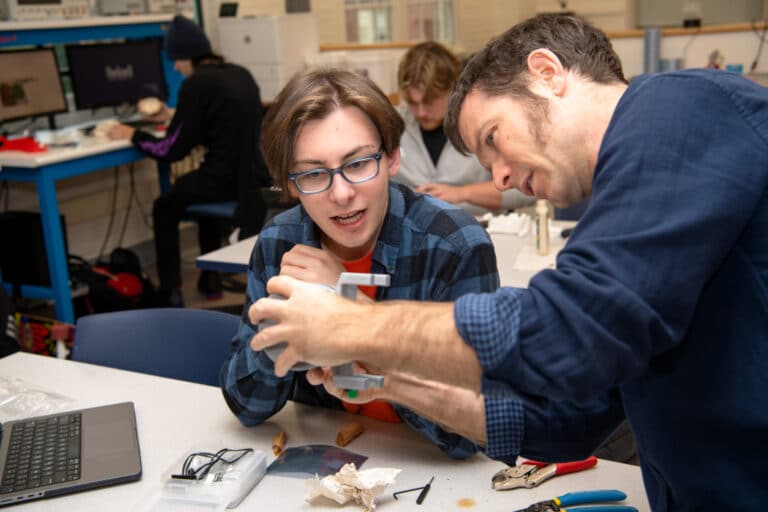
The traditional lecture-based learning model is evolving. Today, classrooms buzz with the energy of “learning by doing,” a trend known as experiential learning. This shift towards hands-on experiences is shaping the future workforce by nurturing graduates with real-world skills and adaptability. They hit the ground running as graduates.
Embedding work experiences directly within the curriculum allows students to bridge the gap between theory and practice. Internships, for example, provide industry exposure, allowing students to hone their skills under professional guidance. What’s more, study abroad programmes or academic field trips broaden their perspectives, exposing them to diverse environments and cultural nuances.
The benefits are far-reaching. Graduates with experience are better prepared and bring confidence, problem-solving skills, and adaptability to their future careers, ultimately increasing their chances of landing meaningful jobs.
Ready to embark on this transformative learning journey? Consider these three US universities for their commitment to hands-on learning:
Bucknell University

At Bucknell University, first-year students start experimenting, creating, and innovating from day one. Source: Bucknell University
Located in central Pennsylvania, Bucknell University offers a unique blend of liberal arts and professional programmes, cultivating an environment where students can “amplify their passions” and explore limitless possibilities.
With just under 4,000 undergraduates, Bucknell provides a close-knit learning environment where students receive personalised attention and mentorship from expert faculty. The university’s focus on undergraduate education means that Bucknellians begin experimenting and creating from day one — in cutting-edge labs, research centres, and performance spaces.
This emphasis on hands-on education develops critical thinking and problem-solving, and drives student innovation. For instance, the Senior Design course in engineering brings students together to tackle real-world challenges with external partners like Keurig Dr Pepper, Corning, and Johnson & Johnson. Similarly, the Management 101 course empowers first-year students to run their own companies, reinvesting profits in the local community.
Students also gain firsthand exposure to the business world through visits to the New York Stock Exchange and Silicon Valley. They can even launch ventures with seed funding from the university or manage a portion of its multi-million dollar endowment. These opportunities provide a competitive edge and solidify Bucknell’s reputation as a breeding ground for future leaders.
Breaking down traditional academic silos, Bucknell encourages students to explore the world beyond their chosen majors. Three distinct colleges — Arts & Sciences, Engineering, and the Freeman College of Management — seamlessly integrate, offering courses with diverse perspectives and fostering collaboration across disciplines. This interdisciplinary approach equips students with a holistic understanding of complex issues and prepares them to enter an increasingly interconnected world.
Bucknell’s accolades reflect its students’ success. Ranked seventh among undergraduate engineering programmes without doctorates (U.S. News & World Report 2023), Top 20 in business (Poets&Quants 2024), and 30th among national liberal arts colleges (US News & World Report 2023), Bucknell demonstrably delivers a well-rounded education.
Rice University

Rice University students take part in social events, intramural sports and student government. Source: Rice University/Facebook
Set within Houston’s vibrant urban landscape, Rice University thrives on its 300-acre, tree-lined campus. A top 20 university, Rice is a unique environment with a 6:1 undergraduate student-to-faculty ratio and a residential college system that cultivates a sense of belonging through social events, sports, and intellectual pursuits. These create close-knit, diverse communities, contributing to Rice’s top rankings for quality of life and value among private universities.
With over 50 undergraduate majors spanning architecture, engineering, business, humanities, music, natural sciences, and social sciences, Rice offers a comprehensive curriculum brimming with opportunities. Minors, interdisciplinary programmes, and pre-professional tracks further enhance the experience alongside ample research and collaboration avenues.
The Jones Graduate School of Business exemplifies this commitment to excellence. Here, students can pursue undergraduate business majors, minors, and even entrepreneurship minors. The business major equips students with a robust foundation in leadership and core business principles, preparing them to make an immediate impact upon graduation. Notably, students learn from the same faculty who teach MBA programmes, producing an intimate community where professors are readily available for individual mentoring and research projects.
For those seeking an entrepreneurial path, the undergraduate Entrepreneurship minor, offered jointly with the George R. Brown School of Engineering, provides an interdisciplinary exploration of innovation and its application to real-world challenges. Students gain theoretical and practical knowledge by participating in events like the Founders Dinner Series, where they network with peers and industry leaders, and the Napier Rice Launch Challenge, a campus-wide pitch competition.
Pomona College

At Pomona College, students start research early. Many tackle projects in nanotechnology, DNA and ageing, and dwarf planetary rotation in their first year. Source: Pomona College/Facebook
Nestled in Claremont, California, Pomona College is one of the world’s leading liberal arts colleges that serves as a gateway to intellectual exploration and boundless potential. Founded in 1887, Pomona thrives on creating opportunities and attracting the brightest minds regardless of financial background.
With an average class size of 15 and an 8:1 student-faculty ratio, this is a campus of close relationships between students and their professors, i.e. some of the best minds in their respective fields. It’s a setting that allows for in-depth discussions, collaborative research, and a personalised learning experience that transcends textbooks.
Pomona’s curriculum doesn’t expect students to memorise and regurgitate. Rather, it’s about critical thinking, effective communication, and pushing boundaries. The 48 majors across arts, humanities, sciences, and interdisciplinary fields offer diverse paths for intellectual growth. Small seminars encourage open dialogue, with professors acting as guides on a shared journey of understanding.
Beyond the classroom, Pomona’s campus is filled with life. Students engage in meaningful conversations, forge lasting friendships, and explore passions through various events and activities. The friendly, inclusive atmosphere makes it easy to feel belong, no matter where you come from.
Step beyond campus and you’re in the Los Angeles area, an extension of the classroom, with geology students exploring volcanic rock, art history enthusiasts analysing Chicano murals, and photography students making the most of the Jet Propulsion Laboratory. Pomona has its own resources too, from a digital planetarium to a biological field station, ensuring students have the tools to dig deeper into their passions.
Here, research isn’t just for graduate students. Even freshmen can participate in projects tackling topics like DNA and ageing or dwarf planetary rotation. This early experience prepares students for future success, as evidenced by the achievements of Pomona graduates who lead in fields ranging from medicine and law to business and journalism. Notable employers of Pomona graduates include Amazon, Deloitte, Microsoft, Meta, and Google.
*Some of the institutions featured in this article are commercial partners of Study International










